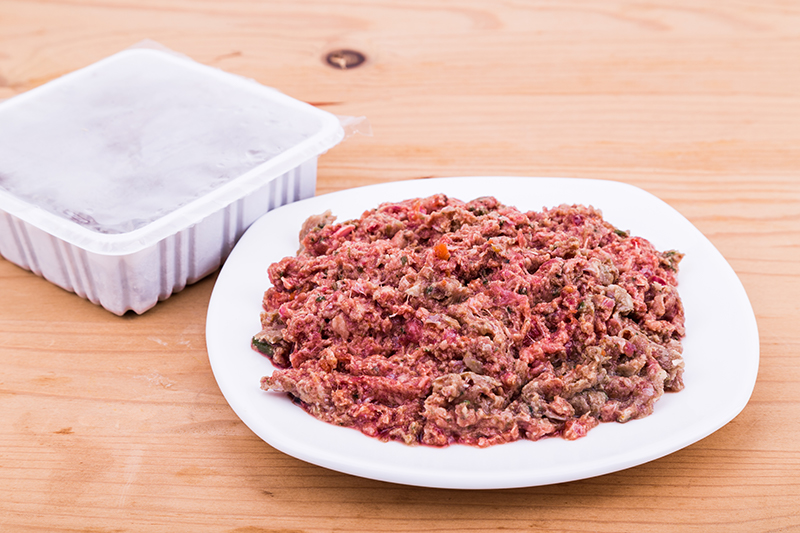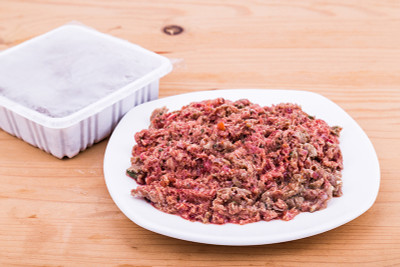Posted by Dr Reagan Camworth on Jul 12, 2020
If you, like many other dog parents have switched your companion to a raw food diet, or are considering it, you might be concerned about information out there that says Raw food is not safe. Here’s another side to the story, from a holistic vet’s perspective. Let’s debunk some of the common criticisms of raw food.

1: There are no health benefits to giving your pet raw food, they should be fed a complete pet food
For the past 50 or so years’, pet parents have been advised by their vets to use commercially available pet food. At Vet School, my nutrition lectures were taught by Hills and Royal Canine. It’s no wonder so many vets are still giving this advice!
However, as a holistic veterinarian, I believe that a good quality, species appropriate diet is the foundation to good health.
I think that we should be aiming for optimum health, not just the absence of disease. Most dogs will do OK on commercially available food for many years and usually wont succumb to disease until later in life. However, I believe that we should be aiming for better than OK and that’s where a raw food diet comes in.
I recommend a raw food diet for most animals coming through my practice. Countless pet guardians have remarked on their animals having better coats, cleaner teeth, more energy and less excess weight when switched to raw. There are millions of animals worldwide being fed in this way. The Raw Feeding Veterinary Society have carried out a great deal of research which has concluded that there are no serious concerns with pets fed on raw food diets.
It’s time to re-consider the use of processed dog and cat food. Take dry foods as an example. Dry pet foods are composed of a minimum of 30% carbohydrate to make them a biscuit, with some diets containing up to 70% carbs. The American Feed Regulatory Organisation, AAFCO, document on minimal recommended nutritional requirements in dog and cat diets does not contain carbohydrates as neither species has any dietary requirement for carbohydrates. Therefore, many processed pet foods are not even species appropriate as they contain large quantities of unnecessary carbs. Vets are seeing an increase in obesity, dental disease, diabetes and cancer and I believe that this is linked to diet.
2: Raw food is unsafe; it contains high levels of bacteria
Yes, raw food contains bacteria. All food contains bacteria. Human beings are made up of millions of bacteria. Bacteria is critical to life!
If you use words like salmonella or campylobacter, that is enough to put most people off feeding raw. A recent study found that 58% of the healthy dogs shed campylobacter in their faeces. ( Chaban et al., 2010). There are 2500 serotypes of salmonella, most of which are not found in humans with salmonellosis. (CDC, 2017).
Gastrointestinal (GI) microbes, or the microbiome, have important roles in the nutritional, immunological, and physiologic processes of the dog. Bacteria are important to optimal health. Commercially available raw foods are checked for harmful bacteria before sale and therefore you are no more likely to introduce harmful bacteria to your dog by feeding these foods than any other.
Hygiene is important when handling and preparing raw meat, however, I believe if a common-sense approach is used and raw food fed responsibly our dogs and families are at no greater risk of contracting pathogenic bacteria.
3: Raw Food is not nutritionally balanced and therefore will cause deficiencies
If you feed your dog raw chicken breast and only that day in day out, yes, you are likely to end up with nutritional deficiencies. It is important that Raw food if fed in a balanced way. Do your research and make sure you’re doing it right and feed a variety of foods. If your just not sure contact an experienced raw feeder or holistic vet for advice. There are also several commercially available complete raw foods out there which have already been balanced.
There will always be people who are not keen on Raw food and that’s fine, it’s not for everyone, but I believe that raw food fed responsibility is not only safe, but the best diet that we can feed our companions for healthy, happy, longer lives.
Dr. Reagan Camworth is a holistic veterinarian practising in Glasgow. Since graduating from the University of Glasgow faculty of Veterinary Medicine in 2014 she has since gained post graduate qualifications in western veterinary herbal medicine and traditional Chinese acupuncture. Reagan is a wellness vet with pro-active approach to health. She is passionate about improving animal welfare through natural and integrative medicine.
References:
AAFCO (2014) Available at: http://www.aafco.org/Portals/0/SiteContent/Regulatory/Committees/Pet-Food/Reports/Pet _Food_Report_2013,Accessed on : 22nd May 2017
Chaban B., Ngeleka M. & Hill J.E. 2010. Detection and quantification of 14 Campylobacter species in pet dogs reveals an increase in species richness in feces of diarrheic animals. BMC Microbiol. 10:73.
